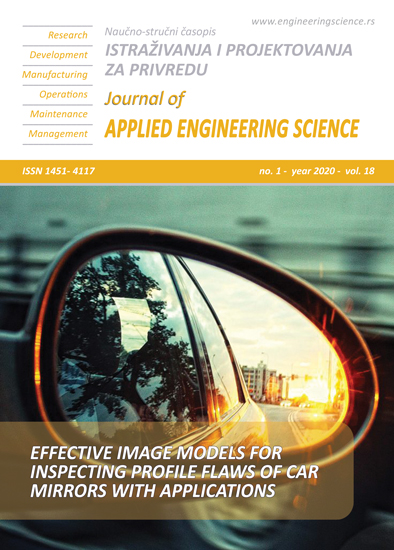CONCEPT OF SELFMAINTAINING VEHICLES
Abstract
Main task of this paper is to present idea of selfmaintaing and make coresponding concept of selfmaintaning vehicles. Through setting parameters of selfmaintaining and providing algorithm of selfmaintenance in vehicles author made attempt to set basic principles in this area of research. Paper presents researched suitability of different drivetrains of vehicles for selfmaintaining. Also, convinient artificial intelligence model for selfmaintaining was reviewed and discussed. Paper discuss near future and future development of maintenance of the vechicles according to presence of mechanical and electrical components. Conclusions made in this papers describes possible ways of future development of maintenance.
References
Kovac, P., Rodic, D., Pucovski, V., Mankova, I., Savkovic, B., Gostimirovic, M. (2012), A review of artificial inteligence approaches applied in inteligent processes, Journal of Production engineering, vol 15, No1
Mark A. Delucchi and Timothy E. Lipman (2010) Lifetime Cost of Battery, Fuel-Cell, and Plug-in Hybrid Electric Vehicles, University California Davis, Universizy of California Berkley, ISBN 978-0-444-53565-8, DOI: 10.1016/B978-0-444-53565-8.00002-6
Bernd Propfe, Martin Redelbach, Danilo J. Santini, Horst Friedrich, (2012) Cost analysis of Plug-in Hybrid Electric Vehicles including Maintenance & Repair Costs and Resale Values, Institute of Vehicle Concepts, German Aerospace Center (DLR), EVS26 Los Angeles, California, May, 2012
prof.dr.Branko Vasic, (1997): Maintnenace Management (Управљање одржавањем), NIRO “ОМО“ ID55447564, Belgrade
Hydrogen Fuel Cell Engines and Related Technologies: Rev 0, December (2001) Module 7: Fuelcell bus maintenance
Richard Raustad, (2017) Electric Vehicle Life Cycle Cost Analysis, Electric Vehicle Transportation Center, EVTC Report Number: FSEC-CR-2053-17
http://www.reliabilityeducation.com/ReliabilityPredictionBasics.pdf
Popovic, V., Vasic, B., Petrovic, M. (2010) The possibility for FMEA method improvement and its implementation into bus life cycle“, Strojniski Vestnik – Journal of Mechanical Engineering 56 3, pp179-185 (UDC 658.56:629.34)
Vujanovic D., Momcilovic V., Medar O. (2018) Influence of an integrated maintenance management on the vehicle fleet energy efficiency“, Thermal Science Vol. 22, No. 3, pp. 1525-1536 (https://doi.org/10.2298/TSCI170209122V)
Vujanovic D., Momčilovic V.,Vasic M. (2018) A hybrid multi-criteria decision making model for the vehicle service center selection with the aim to increase the vehicle fleet energy efficiency“, Thermal Science, Vol. 22, No. 3, pp. 1549-1561 (https://doi.org/10.2298/TSCI170530208V)
Wilson A., de Bruin A., Eweg E., (2008) Guide to Maintenance Management, Hogeschool Utrecht, University of Aplied Sciences, ISBN 978-90-813466-1-0
Petropoulos F., Kourentzes N., Nikolopoulos K., Siemsen E. (2018) Judgmental selection of forecasting models“, Journal of Operations Management 60 (2018) 34–46, DOI (https://doi.org/10.1016/j.jom.2018.05.005)
Chałas K. (2014) Technical culture and human axjosphere, Advances in Science and Technology Research Journal 8(24):pp107–110, DOI:https://doi.org/10.12913/22998624/577
Pedaste M., Mäeots M., Siiman L., de Jong T., van Riesen S., Kamp E., Manoli C., Zacharia Z., Tsourlidaki E. (2015) Phases of inquiry-based learning: Definitions and the inquiry cycle, Educational Research Review 14, pp 47–61, DOI (http://dx.doi.org/10.1016/j.edurev.2015.02.003)
Filipovic S., Stanojevic N. Vujanovic D. Vasic M., 2018, CAPACITY TO CHOOSE ADEQUATE VEHICLE MAINTENANCE METHOD DEPENDING ON DRIVE TYPE, Zbornik radova 3rd Maintenance Forum, Belgrade ISBN 978-86-84231-43-9 , pp 21-38

